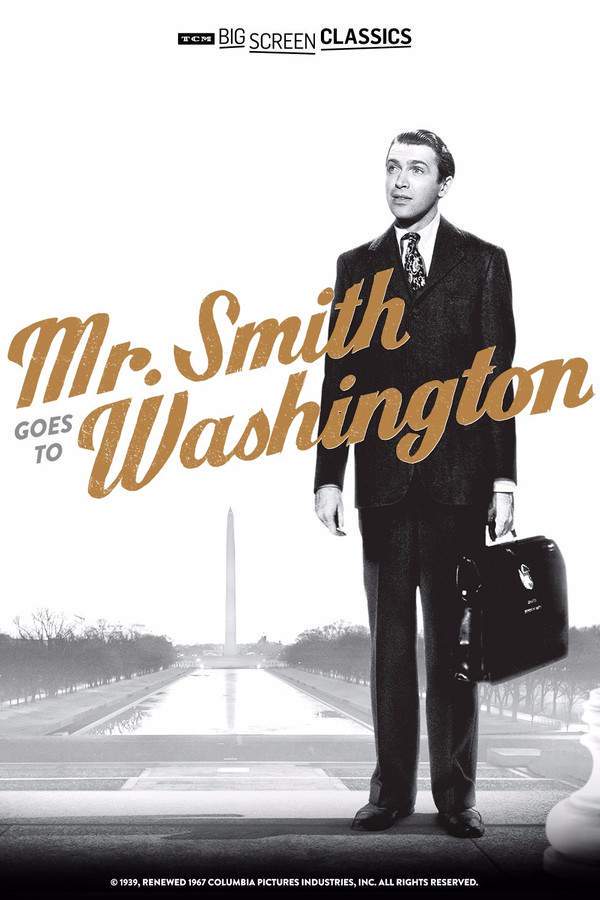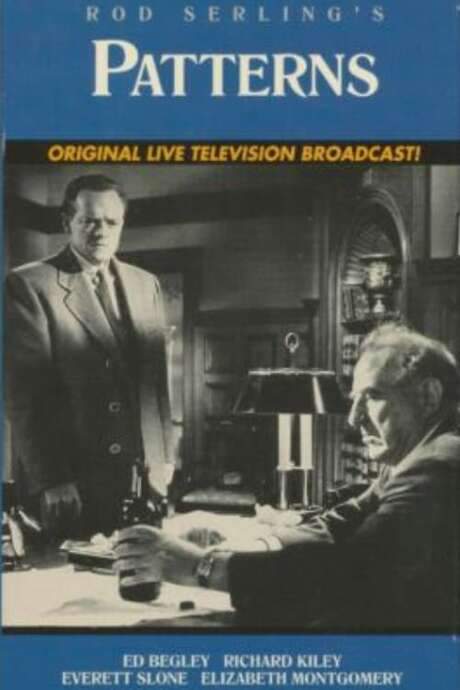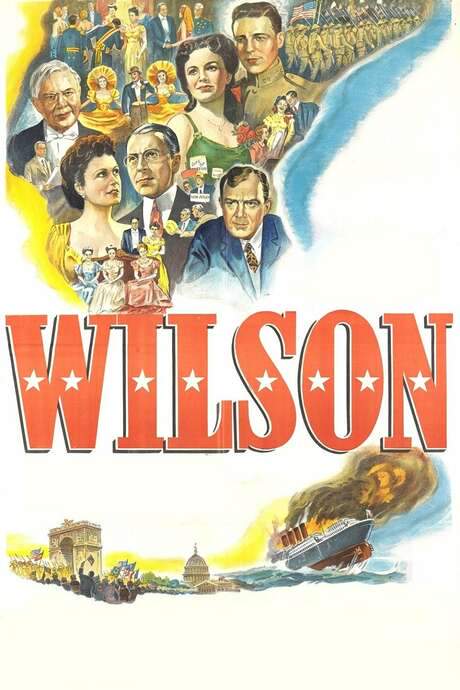
Mr. Smith Goes to Washington
Year: 1939
Runtime: 129 min
Director: Frank Capra
Budget: $1.9M
A sincere and idealistic young man is appointed as a U.S. Senator, unexpectedly finding himself in the midst of political intrigue. He quickly discovers that Washington is rife with corruption and faces challenges to his principles. Despite the pressure and manipulation from powerful figures, he remains committed to fighting for what he believes is right, ultimately striving to reform the system and uphold justice.
Warning: spoilers below!
Haven’t seen Mr. Smith Goes to Washington yet? This summary contains major spoilers. Bookmark the page, watch the movie, and come back for the full breakdown. If you're ready, scroll on and relive the story!
Mr. Smith Goes to Washington (1939) – Full Plot Summary & Ending Explained
Read the complete plot breakdown of Mr. Smith Goes to Washington (1939), including all key story events, major twists, and the ending explained in detail. Discover what really happened—and what it all means.
In an unnamed western state, Governor Hubert “Happy” Hopper (Guy Kibbee) faces the daunting task of selecting a replacement for the recently deceased U.S. Senator Sam Foley. Under significant pressure from his corrupt political boss, Jim Taylor (Edward Arnold), who insists on choosing his own candidate, Hopper is also swayed by the popular demand for a reformer. His children suggest that he nominate Jefferson Smith (James Stewart), the dedicated head of the Boy Rangers. Caught between the two options, the governor resorts to flipping a coin and, when it finds an unlikely balance next to a newspaper article highlighting one of Smith’s achievements, he makes the unexpected choice, believing Smith’s clean reputation will win public approval while his naïveté will make him easily controllable.
Smith soon finds himself mentored by the seemingly honorable but actually corrupt Senator Joseph Paine (Claude Rains), a close friend of Smith’s late father. Additionally, he becomes infatuated with Paine’s daughter, Susan (not portrayed by an actor listed in the provided information). However, the Washington press quickly dismisses Smith as a simpleton unfit for senatorial responsibilities. In an effort to keep him occupied, Paine suggests that Smith introduce a new bill.
Smith proposes legislation to secure federal funding for a national boys’ camp in his home state, which he believes will be repaid by donations from youngsters across the nation. Initial support comes pouring in, but unbeknownst to him, the location for the camp is already entangled in a dubious public works project orchestrated by Taylor’s political machine, with Paine’s tacit approval.
Paine, torn between his loyalty to Smith and the demands of Taylor, ultimately sides with the political machine. When they falsely accuse Smith of attempting to profit from the land deal, Smith is left reeling from this betrayal and flees in distress. However, Clarissa Saunders (Jean Arthur), Smith’s loyal chief of staff, believes in his integrity and persuades him to mount a filibuster on the Senate floor in an attempt to prove his innocence before the vote for his expulsion.
As Smith delivers impassioned speeches that seem to resonate with his constituents, the overwhelming opposition, fueled by the Taylor machine, works tirelessly to undermine him. Smith’s pleas are systematically ignored by the media in his home state, thereby thwarting any support from the public. Even efforts by the Boy Rangers to promote his cause lead to brutal backlash from Taylor’s operatives.
Just when the odds appear insurmountable, attention begins to shift in Smith’s favor as he approaches his physical limits during the filibuster. Paine makes a desperate move by presenting a stack of letters and telegrams from Smith’s state demanding his ouster, leaving Smith utterly despondent. Yet in the midst of despair, he receives a glimmer of hope from a sympathetic smile from the President of the Senate, H.B. Warner (not portrayed by an actor listed in the provided information). Vowing to persevere until the truth prevails, Smith collapses from exhaustion.
Gripped by guilt over his actions, Paine attempts to take his own life but is thwarted. He subsequently bursts back into the Senate chamber, courageously confessing the nefarious plot against Smith and exonerating his innocence, turning the tide in this gripping tale of courage, corruption, and redemption.
Last Updated: October 27, 2024 at 21:34
Explore Movie Threads
Discover curated groups of movies connected by mood, themes, and story style. Browse collections built around emotion, atmosphere, and narrative focus to easily find films that match what you feel like watching right now.
Underdog vs Corruption Movies like Mr. Smith Goes to Washington
One principled individual takes on a powerful, corrupt system for justice.This collection features movies like 'Mr. Smith Goes to Washington' where a sincere idealist challenges a corrupt system. If you enjoyed the inspiring fight for justice against political machinery, you'll find similar stories about moral courage and determined underdogs fighting for what's right.
Narrative Summary
The narrative pattern follows an optimistic individual discovering the dark reality behind an institution they admired. They face intense pressure, disillusionment, and manipulation but refuse to compromise their morals. The climax is a final, exhausting stand—often a public or legal battle—that tests their resolve and ultimately leads to a redemption of their ideals.
Why These Movies?
Movies in this thread share a core theme of moral integrity versus institutional decay. They blend tense procedural drama with an uplifting, hopeful tone, creating a specific emotional mix of righteous anger and inspirational triumph. The pacing is steady, building methodically towards a decisive, satisfying conclusion.
Political Integrity Dramas Similar to Mr. Smith Goes to Washington
Character-driven stories about moral courage within complex institutions.Find movies with a similar feel to 'Mr. Smith Goes to Washington' that explore themes of honesty and ethics within powerful systems. These character-driven dramas feature steady pacing, medium emotional intensity, and focus on the procedural and personal challenges of standing up for one's beliefs.
Narrative Summary
These narratives often follow a linear, straightforward path as a protagonist navigates the rules and unspoken codes of a complex institution. The conflict arises from a clash between personal morality and institutional expediency. The story builds tension through verbal sparring, strategic maneuvering, and moments of high-stakes decision-making, leading to a clear ethical resolution.
Why These Movies?
These films are grouped by their shared focus on institutional settings, a steady procedural pace, and a central theme of ethical choice. They deliver a medium-intensity experience that is intellectually engaging and emotionally satisfying, appealing to viewers who enjoy stories about process, rhetoric, and moral fortitude.
Unlock the Full Story of Mr. Smith Goes to Washington
Don't stop at just watching — explore Mr. Smith Goes to Washington in full detail. From the complete plot summary and scene-by-scene timeline to character breakdowns, thematic analysis, and a deep dive into the ending — every page helps you truly understand what Mr. Smith Goes to Washington is all about. Plus, discover what's next after the movie.
Mr. Smith Goes to Washington Timeline
Track the full timeline of Mr. Smith Goes to Washington with every major event arranged chronologically. Perfect for decoding non-linear storytelling, flashbacks, or parallel narratives with a clear scene-by-scene breakdown.

Characters, Settings & Themes in Mr. Smith Goes to Washington
Discover the characters, locations, and core themes that shape Mr. Smith Goes to Washington. Get insights into symbolic elements, setting significance, and deeper narrative meaning — ideal for thematic analysis and movie breakdowns.

Mr. Smith Goes to Washington Spoiler-Free Summary
Get a quick, spoiler-free overview of Mr. Smith Goes to Washington that covers the main plot points and key details without revealing any major twists or spoilers. Perfect for those who want to know what to expect before diving in.

More About Mr. Smith Goes to Washington
Visit What's After the Movie to explore more about Mr. Smith Goes to Washington: box office results, cast and crew info, production details, post-credit scenes, and external links — all in one place for movie fans and researchers.

Similar Movies to Mr. Smith Goes to Washington
Discover movies like Mr. Smith Goes to Washington that share similar genres, themes, and storytelling elements. Whether you’re drawn to the atmosphere, character arcs, or plot structure, these curated recommendations will help you explore more films you’ll love.
Explore More About Movie Mr. Smith Goes to Washington
Mr. Smith Goes to Washington (1939) Scene-by-Scene Movie Timeline
Mr. Smith Goes to Washington (1939) Movie Characters, Themes & Settings
Mr. Smith Goes to Washington (1939) Spoiler-Free Summary & Key Flow
Movies Like Mr. Smith Goes to Washington – Similar Titles You’ll Enjoy
George Washington (2000) Complete Plot Breakdown
Mr. Smith Gets a Hustler (2002) Full Summary & Key Details
Can Mr. Smith Get to Washington Anymore? (2006) Spoiler-Packed Plot Recap
Washington (1000) Story Summary & Characters
Wilson (1944) Movie Recap & Themes
Joe Smith, American (1942) Full Movie Breakdown
State of the Union (1948) Movie Recap & Themes
Washington Merry-Go-Round (1932) Movie Recap & Themes
Washington Melodrama (1941) Ending Explained & Film Insights
All the King’s Men (1949) Movie Recap & Themes
Mr. & Mrs. Smith (1941) Story Summary & Characters
Advise & Consent (1962) Spoiler-Packed Plot Recap
The Washington Masquerade (1932) Story Summary & Characters
The Senator Was Indiscreet (1947) Story Summary & Characters
Mrs. Washington Goes to Smith (2009) Story Summary & Characters












































